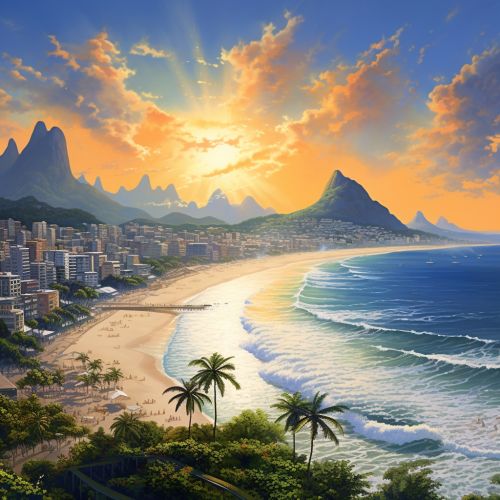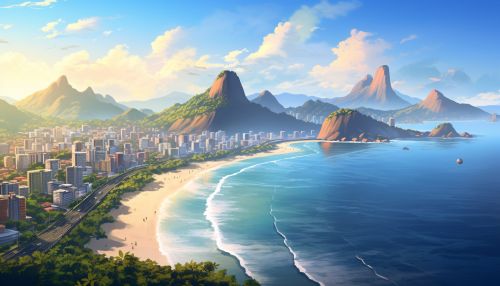Rio de Janeiro
Geography
Rio de Janeiro, often simply referred to as Rio, is one of the largest cities in Brazil. It is located on the southeastern coast of the country, on a strip of land between the Atlantic Ocean and the Serra do Mar mountain range. The city is known for its natural beauty, with a landscape that includes stunning beaches, lush rainforests, and dramatic mountains.


History
The history of Rio de Janeiro dates back to January 1, 1502, when Portuguese explorers led by Gaspar de Lemos first arrived at Guanabara Bay. They named the area Rio de Janeiro, or "River of January," mistakenly thinking the bay was the mouth of a river. In 1565, the city of Rio de Janeiro was officially established by the Portuguese as São Sebastião do Rio de Janeiro, in honor of King Sebastian of Portugal.
During the 18th century, Rio de Janeiro became a major port for the export of gold and diamonds from the mines of Minas Gerais. The city's importance grew in the 19th century when it became the capital of the United Kingdom of Portugal, Brazil, and the Algarves in 1808, following the transfer of the Portuguese royal court to Brazil during the Napoleonic Wars.
Economy
Rio de Janeiro has a diverse economy with strong sectors in services, industry, and tourism. The city is a major center for oil and gas companies, including Petrobras, Brazil's state-controlled oil company, and OGX, a private company. Rio de Janeiro is also home to many multinational companies, such as Coca-Cola, IBM, and Shell.
The city's tourism industry is also significant, attracting millions of visitors each year. Tourists are drawn to Rio's famous landmarks, including the Christ the Redeemer statue, Sugarloaf Mountain, and the beaches of Copacabana and Ipanema.
Culture
Rio de Janeiro is a cultural hub, known for its music, dance, and festivals. The city is the birthplace of samba, a popular music and dance style that has become synonymous with Brazil. Rio is also home to the annual Carnival, a week-long festival that attracts millions of visitors with its parades, music, and vibrant costumes.
The city's cultural scene also includes a wide range of museums, art galleries, and theaters. Among the most notable cultural institutions are the Museum of Modern Art, the National Museum of Fine Arts, and the Municipal Theatre.
